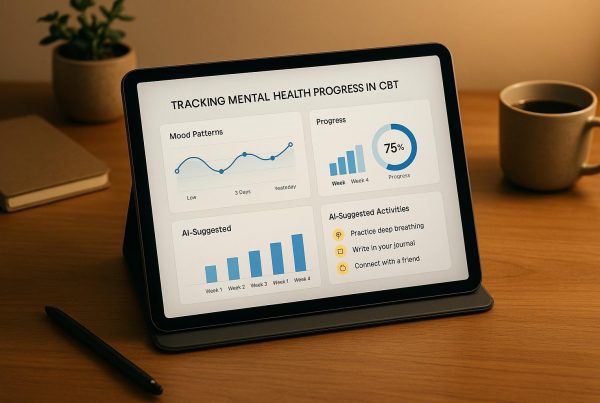AI is transforming mental health care by providing 24/7 support, personalized therapy methods, and tools for tracking progress. It uses proven techniques like CBT, DBT, and mindfulness to help users identify and change negative thought patterns. Key benefits include affordability (up to 80% cheaper than traditional therapy), immediate access with no waitlists, and privacy through confidential, judgment-free sessions. Men are three times more likely to engage with AI therapy than human therapists, making it a promising option for those seeking accessible mental health solutions.
Quick Overview:
- 24/7 Availability: Support anytime, anywhere.
- Cost-Effective: Up to 80% cheaper than traditional therapy.
- Tailored Tools: Voice-based support, microcoaching, and guided visualizations.
- Progress Tracking: Emotional monitoring, goal-setting, and reminders.
- Enhanced Therapy: Complements traditional sessions with therapist collaboration tools.
AI doesn’t replace therapists – it works alongside them to make mental health care more accessible and efficient.
Benefits of AI Cognitive Restructuring
24/7 Support Access
AI tools offer round-the-clock mental health support, eliminating the delays that affect half of therapy seekers [1]. Whether you’re dealing with anxiety in the middle of the night or need support during a quick break, these tools provide immediate, judgment-free assistance. This constant availability ensures help is always just a moment away, catering to users’ unique needs.
Personalized Support Methods
In addition to being available at all hours, AI cognitive restructuring tailors its approach to individual preferences. Research indicates men are three times more likely to engage with AI therapy compared to traditional human therapists [1].
Strength and Mobility Coach Hali shared her experience:
"Aidx has been surprisingly human in identifying problems & asking the right questions. But faster! I got sucked into the conversation like I was talking to an educated & empathetic therapist & every suggestion sent me to where I needed to go. When you’re in quick need of help, attention & direction I think this will be an incredible tool to help people find & hear what they need so they can then take the next necessary steps." [1]
The system offers a range of methods to meet different needs:
| Support Method | Application |
|---|---|
| Voice Interface | Natural, conversational support |
| Microcoaching | Quick, 5-minute sessions |
| Embodiment Mode | Guided visualization techniques |
| Incognito Mode | Private, auto-deleting sessions |
Progress Monitoring
AI tools go beyond providing support by tracking user progress over time. They monitor emotional states, stress levels, confidence, and performance, offering automated reminders and goal-setting features. Tools like "Friday Wins & Monday Goal-Setting" encourage users to reflect on their achievements and stay focused on their cognitive restructuring goals [1].
AI-Powered Mental Health: Unlocking Cognitive Behavioral …
AI Cognitive Restructuring Methods
These methods aim to address deeply ingrained cognitive challenges, offering behavioral change through AI-powered support systems.
Changing Negative Thought Patterns
The Adaptive Therapeutic Intelligence (ATI) System™ uses advanced pattern recognition to identify and address harmful thought processes. Drawing from techniques like CBT, DBT, ACT, and NLP, the AI evaluates conversations and emotional cues to correct cognitive distortions in real-time [1].
"I tried Aidx a few weeks ago and it was a really surprising experience! I shared a very specific topic and was guided through relevant questions, practical tips and actionable steps. The process was very natural and, above all, it was very useful. It was amazing to see how Aidx managed the specificities of the issue so well. Furthermore, also the way it was empathetic without being ‘robotic’, how it dealt with the emotional content and, most surprising of all, how it had such an ethical approach. I still can’t believe the warm, human-like dialogue I was able to have with Aidx. Thank you for your lovely help, Aidx!" – Vera Martins, Psychologist [1]
Common thought patterns and how the AI responds include:
| Thought Pattern | AI Response Strategy |
|---|---|
| Catastrophizing | Evidence-based reality testing |
| Black-and-white thinking | Encouraging nuanced perspectives |
| Self-criticism | Reframing with compassion |
| Overgeneralization | Offering specific counter-examples |
Beyond reshaping thought patterns, the system equips users with tools to monitor their own progress.
Self-Analysis Tools
AI platforms now include features that track emotional states, behaviors, and progress over time, helping users reflect and grow.
"My experience with Aidx was impressive. It offered great support and ideas, and I could have fluent conversations with it. On top of that, it checked in with me. I think it’s a brilliant tool for anyone who needs quick support, hasn’t found a therapist yet, or can’t afford a session at the moment. It’s game-changing and will shake the industry very quickly." – Salvija, Abuse Expert and Clinical Hypnotherapist [1]
The self-analysis toolkit offers:
- Emotional and behavioral tracking
- Metrics for performance and goal achievement
- Intelligent follow-ups and reminders
To complement these tools, voice-based support provides immediate, hands-free assistance during daily routines.
Voice-Based Support
Voice interaction makes therapeutic support more accessible, allowing users to process emotions and receive guidance while multitasking [1].
Key features of the voice system include:
- Recognizing emotional nuances in speech
- Maintaining natural, conversational interactions
- Providing hands-free support
- Offering real-time emotional guidance
sbb-itb-d5e73b4
Using AI Cognitive Restructuring
Mental Health Management
AI-driven cognitive restructuring offers round-the-clock support for managing mental health challenges. The Adaptive Therapeutic Intelligence (ATI) System™ helps users handle stressful situations by providing evidence-based coping strategies whenever needed. This 24/7 availability is especially valuable since mental health support is often required outside of standard therapy hours.
"As a mental health professional committed to supporting individuals who struggle with how their thoughts and feelings impact them, I was intrigued about the concept of Aidx. After trying it for myself I have found that it has had a positive influence on how I approach my own issues and difficulties…It also helped me to see things from a different perspective, reminded me how to problem-solve for myself, and gave me reassurance that there was support that I could rely on (any time of the day or night) if and when I needed it." – Cleo Brooks, Psychologist & Mental Health Clinician [1]
This immediate support is further enhanced by turning insights into actionable goals.
Goal Planning Support
The platform’s planning system bridges the gap between understanding and action. By combining cognitive restructuring with practical goal-setting tools, users can create a structured approach to personal growth. Key features include:
| Feature | Purpose | Benefit |
|---|---|---|
| Friday Wins | Weekly reflection on progress | Encourages self-confidence by recognizing achievements |
| Monday Goal-Setting | Weekly planning sessions | Provides clear, actionable steps for the week |
| Multi-channel Reminders | Task follow-ups | Keeps users on track with notifications via WhatsApp, Telegram, and email |
These tools ensure that personal breakthroughs lead to measurable progress, helping users stay accountable and motivated throughout their mental health journey.
Working with Therapists
AI cognitive restructuring also enhances traditional therapy by bridging the gap between sessions. The upcoming Practitioner Mode will allow therapists to:
- Monitor client progress in real time
- Assign tailored cognitive exercises
- Track emotional trends between appointments
- Offer additional support through AI-guided tools
This system addresses a critical issue: nearly 50% of people seeking therapy face difficulty finding availability [1]. By combining instant AI support with therapist-led care, the platform creates a more comprehensive support system for mental health.
Looking Forward: AI in Mental Health
Recent data highlights how AI-driven tools are reshaping mental health care by improving access and cutting costs. This shift is paving the way for new therapeutic methods that tackle long-standing mental health challenges.
Overcoming Mental Health Challenges
The ATI System™ has shown strong results, and its AI-powered cognitive restructuring is changing how mental health support is delivered. It integrates several evidence-based techniques:
| Therapeutic Approach | Application | Benefit |
|---|---|---|
| CBT & DBT | Instant thought correction | Helps counter negative thought patterns quickly |
| ACT & NLP | Behavioral adjustments | Strengthens emotional resilience |
| Voice-Enabled Support | Natural conversation | Makes seeking help feel less intimidating |
Mental health professionals are seeing the effects of these AI tools firsthand. Salvija, an Abuse Expert and Clinical Hypnotherapist, shared her experience:
"I was quite excited to test aidx.ai, as a person who is curious how far AI will impact our lives I was waiting ’till it enters the mental health sector and especially helping people… My experience with aidx was impressive, it offered great support and ideas, was able to have fluent conversations, on top of that it checked in with me. It has areas to improve as any system, but I think it is a brilliant tool for anyone who needs support quickly and maybe hasn’t found their therapist yet or can’t afford a session for the moment. It is truly game changing and will shake the industry very quickly." [1]
This shift is addressing a major issue in mental health care – delays in finding timely support [1]. AI-based tools are filling this gap by offering immediate, accessible assistance while upholding the quality of traditional therapeutic practices. By combining real-time availability, proven methods, and tailored support, these tools are making emotional well-being more attainable for everyone.
FAQs
How does AI-powered cognitive restructuring compare to traditional therapy in effectiveness and user experience?
AI-powered cognitive restructuring offers a modern, flexible approach to personal growth by providing real-time, on-demand support that adapts to your unique needs. Unlike traditional therapy, which typically occurs in scheduled sessions, AI tools like Aidx are available 24/7, enabling users to address challenges as they arise in everyday life.
With features like personalized coaching, adaptive techniques, and voice-enabled conversations, AI-powered solutions deliver a highly tailored experience. They integrate seamlessly into your routine, offering tools like goal tracking, reminders, and emotional progress monitoring to bridge the gap between insights and actionable change. While traditional therapy provides invaluable human connection, AI-powered tools enhance accessibility, convenience, and ongoing support for a holistic growth journey.
How does the AI help reframe negative thought patterns, and what techniques does it use to personalize its approach?
The AI leverages evidence-based techniques from CBT (Cognitive Behavioral Therapy), DBT (Dialectical Behavior Therapy), ACT (Acceptance and Commitment Therapy), NLP (Neuro-Linguistic Programming), and performance coaching to help reframe negative thought patterns. It identifies limiting beliefs, challenges unhelpful thinking, and guides users toward healthier perspectives.
What sets it apart is its ability to adapt in real time. By analyzing your emotional state, goals, and past interactions, the AI tailors its responses to meet your unique needs, creating a deeply personalized and effective experience for mindset shifts and personal growth.
How can AI-powered cognitive restructuring enhance traditional therapy, and how might therapists incorporate these tools into their work?
AI-powered cognitive restructuring tools, like those offered by Aidx.ai, enhance traditional therapy by providing real-time support between sessions. They help users navigate mindset shifts, emotional breakthroughs, and behavioral changes as they occur, offering a continuous layer of guidance that complements the work done in therapy.
Therapists can incorporate these tools into their practice by using them to extend support beyond scheduled sessions. AI tools can assist in tracking client progress, providing actionable insights, and reinforcing evidence-based techniques, creating a seamless blend of human expertise and AI-driven assistance.



